5 Surprising Feeding Setbacks...and How to Avoid Them
- Fears that parents experience when introducing their babies to solid foods.
- A parent's power to help decrease the risk of food allergies by introducing allergenic foods early and often to their babies.
- Tips on getting daycare and family members on-board with baby-led weaning in order to create a supportive community
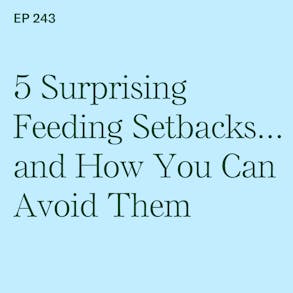
LISTEN TO THIS EPISODE
Episode Description
Finding yourself hesitant to start baby-led weaning with your baby because of the constant feeding push-backs you encounter as a parent? Feeling a bit overwhelmed because of the fear of watching your baby gag when eating? Preparing for what is to come and understanding the natural process of transitioning to solid foods will help a parent become confident in their baby’s ability to self-feed. In this episode I am sharing tips and tricks on how parents can work around feeding roadblocks they encounter while baby-led weaning.
Links from This Episode
- I recently started Youtube channel so that I could really walk parents through baby-led weaning and their fears with more visual examples…SUBSCRIBE to my channel at BABY-LED WEANING WITH KATIE FERRARO to learn more!
- Baby-Led Weaning with Katie Ferraro program with the 100 First Foods™ Daily Meal Plan, join here: https://babyledweaning.co/program
- Baby-Led Weaning for Beginners free online workshop with 100 First Foods™ list to all attendees, register here: https://babyledweaning.co/baby-led-weaning-for-beginners
Other Episodes Related to this Topic
- Episode 22 “Grandparents, Spouses & Partners: Getting Others on Board with BLW”
- Episode 237 “Getting Grandparents on Board: BLW Across Generations”
- Bonus Episode “Interviewing my Mom: How She Didn’t Like BLW at First & Why She Changed”
- Episode 42 “Daycare: How To Be An Advocate for Baby-Led Weaning with Poppy Duhnke” download FREE FEEDING GUIDE
- Episode 64 “How to Pre-Load A BLW Spoon Self-Feeding Technique with Dawn Winkelmann, MS, CCC-SLP”

Latest Episodes
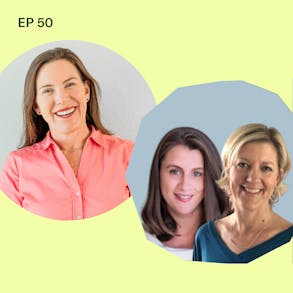
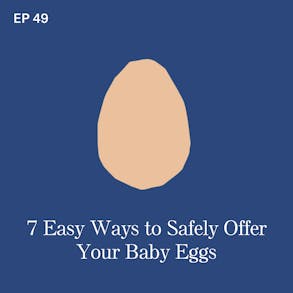

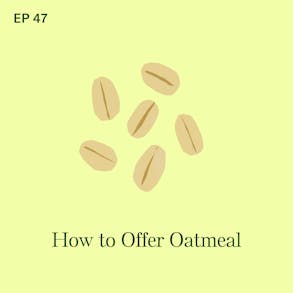
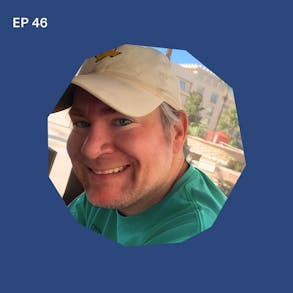
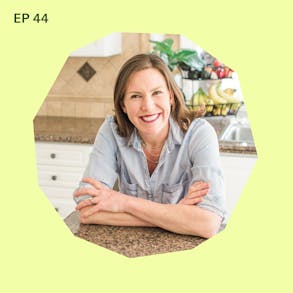
Katie Ferraro (28s):
So this notion of, well, I can't do baby led weaning cause someone in my family doesn't agree or the daycare says, Nope, we only do purees. There's definitely ways to work around this so that you can safely offer your baby the food that are developmentally appropriate, even when you're facing some of these pushbacks. Hey, there I'm Katie Ferraro, Registered Dietitian, college nutrition professor and mom of seven specializing in baby led weaning here on the baby-led weaning made easy podcast. I help you strip out all of the noise and nonsense about feeding, leading you with the competence and knowledge. You need to give your baby a safe start to solid foods using baby led. Weaning. What sort of roadblocks have you encountered since starting solid foods?
Katie Ferraro (1m 15s):
If you've already made the jump into this transition to solid foods with your baby, and you've tried some of the simple starter foods, you've no doubt encountered maybe some incidences that you're like, huh? I did not see that one coming. Or I definitely didn't anticipate that. Or some of you are here and you're learning about baby-led weaning before you even get started. And maybe you're trying kind of forecast where you might get stuck. And I don't know about you. I'm a type a person. I love to tell my husband, he's not a big planner, which is why I normally make the plan. And like, I don't care what the plan is. I just need you to know what the plan is. Like, what it entails is not important. I just need to know what it is so I can plan. And so I like to know what roadblocks are. I like to know where I might get stuck so I can plan for it.
Katie Ferraro (1m 55s):
We were just on a summer road trip. I took our seven kids to Las Vegas. It's supposed to be a five-hour drive from San Diego, but like it's always eight hours because of the bathroom stops and traffic, et cetera. And I'm looking at the map and I'm like, I just want to know where the slowdowns are going to be. So I was thinking about kind of the analogy of the baby-led weaning journey is that there are roadblocks. And a lot of times, a lot of other people are encountering these as well, but sometimes ones pop up that you're like, huh? I didn't really think I was going to struggle with that. So in today's episode, I want to share five surprising feeding setbacks and how you can avoid them. All right. Let's get started Surprising setback. Number one is gagging. A lot of times, no matter how you decide to start solid foods, be it traditional parent led spoon-feeding baby-led weaning or some variation or combination of the both.
Katie Ferraro (2m 39s):
It doesn't matter because you are going to at some point be fearful that your baby is going to choke on food. And what's interesting is I teach webinars and we amass all the questions. We're always looking at the data and choking, choking, choking, choking is the number one thing parents think they're scared of, but when they actually sit down and start doing baby led weaning, they're waiting until their baby is really ready. It's the gagging that really freaks them out. And so one thing that I think is so important as you prepare to help your baby make this transition is to really understand the difference between gagging and choking. That is so important. I, we say gagging is a good thing. If there's any mantra to put in your head, it's that gagging is a good thing. Okay? Your baby gagging on food is an important natural, unnecessary part of the learning, how to eat process.
Katie Ferraro (3m 24s):
And yet a lot of parents are like, I can't deal with the gagging. Well, your baby has to learn how to eat. And if your baby is ready to start solid foods, gagging is going to be part of the process. And so what I encourage parents to do is to watch videos of other babies gagging. And it sounds like a weird thing to do, but the rationale behind this is watching videos of other babies, eating food and gagging, and then recovering on their own. It can give you so much confidence in your baby's ability to do the same. Now, since I started my babyledweanteam instagram account, I started documenting baby-led weaning on Instagram, back in 2016, and then spun off that account in 2018. One thing I've really been known for are sharing gagging videos. So we used to have kind of a different content calendar than we do now with Instagram prioritizing reels.
Katie Ferraro (4m 10s):
Unfortunately we've had to do what Instagram wants, which is a six second reels over and over and over. So attention spans have got a lot shorter. However, we're still incorporating gagging content, but I used to every other Wednesday post a whole montage of gagging videos. And we linked them all up with a #GusandHannahgag. Wasn't my youngest twin babies names. And I started posting the gagging videos when they were starting solid foods over four years ago. So if you go to the hashtag on Instagram, Gusandhannahgag, you can see lots of gagging videos there, but also we recently launched a baby led weaning YouTube channel. And part of the reason there was cause a lot of you guys write and tell us, listen, I'm not on Instagram for whatever reason. And that's awesome. You might choose to learn in a different way. And so I wanted to be able to provide video content to people who are interested in learning from longer than six, second reels or tictoks.
Katie Ferraro (4m 54s):
So long-form education is over on YouTube at r/babyledweaning channel. And we're working on a lot of gagging content there as well, teaching about the difference between gagging and choking. And I just wanna remind you with regard to choking that babies who start solid foods with a baby-led approach, They are at no higher risk of choking than our babies who are traditionally spoonfed provided that the parents are educated about reducing choking risk. And so it is so important that you know, basic CPR, I current all parents before you start solid foods to take an infant refresher CPR course, I know you took CPR six months ago, but that was, you know, before your baby was born. And now you're dealing with a whole other set of fears, not to mention, I don't know about you, but I can't remember the particulars of a course.
Katie Ferraro (5m 36s):
I took six months ago. I take online CPR every quarter, this refresher course, and I take a course from a company called Thrive Training Institute. I've had their founder and father baby-led weaning dad. They're just getting ready to start with number three, Brandon doerksen on the podcast a number of times and Brandon's online CPR course it's already really affordable, but I have an affiliate discount code, KATIE10 for $10 off. I think it takes the course from like $35 down to $25. You can get your CPR skills up to snuff. I'll link to it in the show notes here, but it's just Bit.ly/onlineCPRcourse. So bit dot Lee slash online CPR course. And again, that code is KATIE10. Knowing CPR is so important in order to be able to save your child's life if they do choke, but also recognizing that gagging is so different than choking.
Katie Ferraro (6m 25s):
So don't be surprised when your baby gags on food and it freaks you out, but watching a lot of videos and then knowing what to do if they do choke is so important. Second surprising setback, allergic reactions. I think a lot of times, if you did not grow up in a family with food allergies and that's the vast majority of us, because even though food allergies are on the rise, they still only represent a small subset of the population, but you may never have thought about the fact that your baby might have an allergic reaction to food and all of the updated research and the new guidelines are pointing towards early introduction of allergenic foods as a way to prevent food allergy. And so parents sometimes are so concerned about food allergies that they're actually withholding or not offering the allergenic foods.
Katie Ferraro (7m 8s):
So I'm scared the baby's going to have a reaction when in fact the only thing that you can do to reduce your baby's risk of food allergy is to offer the allergenic foods early and often. Again, the only thing you have control over there are factors and risk factors for food allergy that we can control. And we can't control. I just finished this whole year long advanced training on pediatric food allergies. And as much information is out there and like the one methods it's not getting to parents is about prevention. Again, the only risk factor we have control over as parents and caregivers is offering allergenic foods early and often is the only way we can help reduce food allergy risk. You can't reduce the risk of your baby having severe eczema.
Katie Ferraro (7m 49s):
You can't reduce the risk factor of babies. Having egg allergy puts them at higher risk for peanut allergy. You can't reduce the risk factor that someone a first degree relative already has an existing food allergy. Okay? But the one thing we can have control over is offering these foods early and often. So don't be scared about allergic reactions instead recognize the power that you have as a parent to offer these foods to your baby early and often. And I have tons and tons of resources on how to do that safely actually put together a whole allergenic food introduction course that I co-teach with Dr. Ron Sunon, he's a pediatrician and very well-known in the infant feeding space as a doctor who is pro food for preventing food allergies. Our course is at foodallergyclass.com.
Katie Ferraro (8m 30s):
We teach about each of the different allergenic foods. I show you recipes on how to make the allergenic foods safe for your baby at three different stages. From six months of age on you do not need to buy expensive or gimmicky supplement programs or powders or mix-ins to offer allergenic foods to babies. Because all this research we have has been done showing the impact of offering foods to babies, not supplements, and you can serve these foods safely to your baby. So don't be scared about allergic reactions. The third Surprising Feeding Setbacks. First one is gagging. Second one is allergic reaction is no support from family. Okay? And you might be gung ho about wanting to do baby-led weaning, and you're learning all about it from me and from other credentialed feeding experts that are out there sharing very valuable, reputable evidence-based information.
Katie Ferraro (9m 14s):
And yet when it comes time for you to offer this FIRST FOODS to your baby, someone on ant a mother-in-law mom and nanny, someone in your family space is going to say, well, I spoonfed you and you turned out fine, or that baby's not getting enough. You need to be pushing the spoon in the mouth. And so this feeling of isolation and not having support from your family, it can be very, very frightening to parents because your family has helped you get to this point for many of you who maybe struggled to get pregnant or infertility, or had rough pregnancies or struggled with postpartum depression, you know, you've leaned on your family for support. And when it comes time to start solid foods. At six months of age, we hear from parents and caregivers all the time and say, I don't feel like the rest of the family is on board.
Katie Ferraro (9m 56s):
So the whole part of creating this community about supporting parents through the baby led weaning journey is to be an extension of your family, but also to help educate your family. So I want to give you a couple of tips. If you're struggling with getting your family on board with baby led weaning. The first one is that if you are listening to this podcast about baby led weaning and you have a baby, my assumption is, is that you are the primary feeder. I don't even like using the word feeder because it implies that you're putting food in your baby's mouth, but you are the person responsible for the food that your baby eats. And as a result, you are the one that needs to get comfortable with baby led weaning first. So it encourage you to block out all of the noise and really focus on a few safe foods that you safely can prepare for your baby.
Katie Ferraro (10m 39s):
Your baby can safely eat and make sure you have those foods under your belt before you invite anyone else in your family to observe. And that may be even your husband or partner or the other parent. And I know my own case doing baby-led weaning with six of our seven kids. I struggle with spoonfeeding with our oldest. She was a Singleton when she was 18 months, we had quadruplets and that's when I started doing baby led weaning, but it was messy. It was ugly. I didn't know what I was doing. I was making lots of mistakes through a lot of trials and tribulations. We figured it out and the babies ate a hundred foods before they turned one. And I created this a hundred FIRST FOODS program that has now kind of become a global phenomenon, but I didn't know what I was doing back in the day. And at the same time, when they were 18 months, we went on to have another set of twins. So we had seven kids, three and under, and when I was doing baby-led weaning with the twins, I was already teaching baby led weaning full time.
Katie Ferraro (11m 24s):
And the a hundred FIRST FOODS program was already up and running and it was doing the a hundred FIRST FOODS with our twins, Gus and Hannah. And I remember my husband walking in on buckwheat day. I remember like yesterday. And he was like, are you sure they can eat that? They're going to choke? I'm like, are you sure? It looks like he's choking was like, do I even know what I do for a living and be, if you are not going to be supportive, you don't need to be here. So again, you have your own dynamic with the other parents in your household, but it's okay to be the primary feeder for awhile until you get over. Especially the hump of the first few days and the weeks now, when it comes to grandparents, I've got a couple of good resources for you. So 22 is about grandparents, spouses, and partners getting others on board with baby led weaning. And that's a really early episode from almost two years ago at this point. So I share just some strategies and tactics and tips, but we also did another grandparents' episode recently in episode 237.
Katie Ferraro (12m 10s):
And that's where we interviewed two different grandma's, grandma Terry and grandma Peggy. And they're going through baby-led weaning right now had a two different stories about how they got okay with it. And I think there might be some tips that you may find applicable to your own family as well. And then I do like to share too, that my own mom didn't like baby led weaning. My mom is a dietitian as well. She was self-described old school, home-ec dietitian. And she thought it was silly. She's like, I can't believe you have entire career that teaches people how to just make a baby eat and not making them eating and letting them do what they were born to do. But she wasn't on board with baby led weaning at first. And that was hard for me because she wasn't supportive and she thought it was silly. And I always share that eventually she came around on baby led of it.
Katie Ferraro (12m 53s):
I actually interviewed her for a mother's day podcast last year. So there's an episode called Interviewing My Mom: How She Didn't Like BLW at First and Why She Changed. And I think sometimes just even hearing other people's stories and knowing that you're not alone can help you realize it also at the end of the day, it's your decision, how you decide to offer foods to your baby. And you can block out other people to some degree who may not be on board with your decision because you reserve the right to offer your baby foods in a manner that is safe and developmentally appropriate for them. All right. Fourth surprising feeding setbacks: daycare. A lot of you guys might be in a situation where you are not the one offering foods all day long, or you have been the one, but now it's time to go back to work and your baby is going to be under the care of a caretaker or daycare, a nanny.
Katie Ferraro (13m 38s):
And this is a different relationship that family. And when we were planning this episode, Edna is our podcast manager and Katelynn is our dietitian. Lauren is our strategist and we always kind of chat about our episodes and the outline and what we're including. And I said, you know, I feel like family and daycare kind of go hand in hand and those should be one setback. And Katelynn made a good point. Like, no, it's not the way you talk to your family. Who's voluntarily helping you versus a childcare provider who let's be real. That's their job. And they're being paid to do it. You use a totally different set of language and that's absolutely true. So for those of you who are in a situation where your child does go to daycare, I'm always amazed when parents are like, oh, they just don't do baby led weaning, and I've done so much work with daycares and we're doing a lot more work training and credentialing daycare providers to do baby led weaning because sometimes they are the setback in the sense that if the daycare says I don't do baby-led weaning, then the family thinks they can't do baby led weaning.
Katie Ferraro (14m 29s):
And that's certainly not the case that can episode 42. It did kind of a whole debrief on daycares, how to be an advocate for baby led weaning. And they interviewed a home daycare owner who also a baby led weaning twin mom about some strategies that work and don't work when you're chatting to your daycare providers. But you can check that out at episode 42. So BLW podcast.com/42, and there's a good download linked. That's a free feeding guide on that show notes page that tells you the language to use for how to be an advocate at daycare, but just be prepared that sometimes when daycare says, no, we don't do baby led weaning. What they're really saying is we don't know how to do baby led weaning. And what that means is it may require you to be the one to teach them.
Katie Ferraro (15m 13s):
And if they've never seen sometimes, no, we don't do baby led. Weaning also means I don't know what it is. I've never seen that. So I'm just going to say no, but if you can request a meeting, if you can show how your baby gets positioned safely in the highchair, the gear that you're using, the food that you're bringing, set it all up and show the baby self-feeding seeing really is believing with baby led weaning. And for many families just getting over that hump and having, you know, most of you have great rapport with your daycare providers or you wouldn't be paying them to watch your kids. And parents think nothing of having really elaborate. You know, I like diaper care regimens. I want this diaper cream on this butt cheek. And this one on the other, I mean, I know you don't, I'm kind of kidding, but like then they never think to ask for a special setup for feeding. Like if your child had a medical need and you needed to feed them with the two feed, you would show them how to do the two feeding take care of what is it.
Katie Ferraro (15m 57s):
If you have a special request with regard to feeding and it's different if you're not dealing with a medically fragile child, but it's the same point that you reserve the right as the paying customer and the parent to show what foods you want your baby to eat and not eat. And I often encourage parents if, especially if the daycare will only do purees, remember purees are a very important texture for your baby to master. It's just not the only texture your baby can eat. And so, as a result, you can do purees, but we can honor the self-feeding principles of baby led weaning and still offer pureed foods. And that's, if we use the pre loaded spoon technique and the preloaded spoon technique is a term coined by Dawn Winkelman. She's a speech language pathologist, feeding therapist.
Katie Ferraro (16m 38s):
She has been on the podcast numerous times back in episode 64. She taught us about how to preload a BLW spoon and showed us as much as you can on a podcast that self-feeding technique. And you can show that to your daycare provider as well, so that they're not putting the spoon in your baby's mouth, because remember putting anything in a baby's mouth, including a spoon can be a choking hazard. So the fourth Surprising Feeding Setbacks that you might encounter is daycare. The last feeding setback that I'm going to share is running out of ideas of foods to feed your baby. And for years I've taught over a shop called what do I feed my baby after avocado banana and sweet potato? Because it's not necessarily a question that parents are willing to ask, but like when you ask them, they're just feeding those same three baby led weaning foods over and over and over avocado banana sweet potato.
Katie Ferraro (17m 20s):
And then weeks and months later, the baby's still only had three foods, avocado, banana, and sweet potato, not dissing those foods, but there's no iron in them. They don't represent any challenging textures that baby's six months of age and beyond should be exploring. They're not nutritionally complete. And parents get stuck on those simple starter foods. And so back in 2016, when I created the a hundred FIRST FOODS approach, I could have never known that a number of years later in 2021 and 2022, we're starting to see this emergence of research that really supports diet diversity. And you're going to be hearing so much more about that term, but research is showing us that diet diversity is the key to helping reduce food allergy risk, to reducing the severity of picky eating, to help us raise independent eaters.
Katie Ferraro (18m 3s):
And it starts with taking advantage of that flavor window. I call it the honeymoon feeding phase, that period, where your baby will like and accept a wide variety of foods and flavors and tastes and textures. And it feels like a lot of pressure on parents. Sometimes I'm like, gosh, I have to do all these foods. But the point of the a hundred FIRST FOODS approach is just to set up a blueprint, a systematic approach to introduce your baby to one new food a day. So I teach a five step feeding framework that I created to help you implement the foods on the a hundred FIRST FOODS list. There's five different categories, and I show you how to do one food from each category five days a week, it's 20 foods a month in five months, your baby has eaten a hundred foods and I teach more about my five step feeding framework and the a hundred FIRST FOODS approach on my free online workshop.
Katie Ferraro (18m 46s):
It's called BABYLED WEANING FOR BEGINNERS. If you don't have a copy of my free hundred FIRST FOODS list, I give it away to everybody on that workshop. You want to sign up for this week's workshop times it's at baby led weaning.com. You can grab a spot it's a one hour long video training. Again, sometimes it takes a while to teach an entire concept like baby led weaning as much as I love making six second Instagram reels and tic talks. I love the opportunity to kind of teach you in a more formalized setting. Walk you through the research, the history show you what the food should look like. Give you ideas on what the first 10 days and some ideas of foods you can feed, how you do the allergenic foods, what foods not to feed. We do that all in an hour plus a Q &A just in case you have any outstanding baby-led weaning questions.
Katie Ferraro (19m 30s):
I'm here for you as a resource on that free training. Again, it's called BABYLED WEANING FOR BEGINNERS. You can sign up at baby led, weaning.com and everyone on that free workshop gets a copy of the a hundred FIRST FOODS list, because I never want you to run out of ideas on what foods you can feed your baby next. So head to the show notes for this episode to get all of the other episodes that I mentioned in case any of that is resonating with you. And you're like, Ooh, I need more tips on how to get grandma on board. Oh, or I need that language for how to talk to daycare, or I want that a hundred FIRST FOODS list. So I don't run out of ideas of what foods to feed my baby. It's all in the show notes for this episode, which you can find at blwpodcast.com/243. Thanks so much for listening.
Katie Ferraro (20m 10s):
I'll see you next time.

The Program Baby-Led Weaning with Katie Ferraro
A step-by-step digital program for starting solid foods safely and navigating the original 100 FIRST FOODS™ meal plan with baby-led weaning.
 EXPERT-LED, PROVEN APPROACH TO EATING REAL FOOD
EXPERT-LED, PROVEN APPROACH TO EATING REAL FOOD CONCISE VIDEO TRAININGS TO MASTER BABY-LED WEANING
CONCISE VIDEO TRAININGS TO MASTER BABY-LED WEANING 100 FIRST FOODS DAILY MEAL PLAN WITH FOOD PREP VIDEOS
100 FIRST FOODS DAILY MEAL PLAN WITH FOOD PREP VIDEOS
Baby-Led Weaning for Beginners Free Workshop
Is your baby ready to start solid foods, but you’re not sure where to start? Get ready to give your baby a solid foundation to a lifetime of loving real food…even if you’re feeling overwhelmed or confused about this next stage of infant feeding.
Get baby-led weaning recipes and tips delivered to your email inbox.


